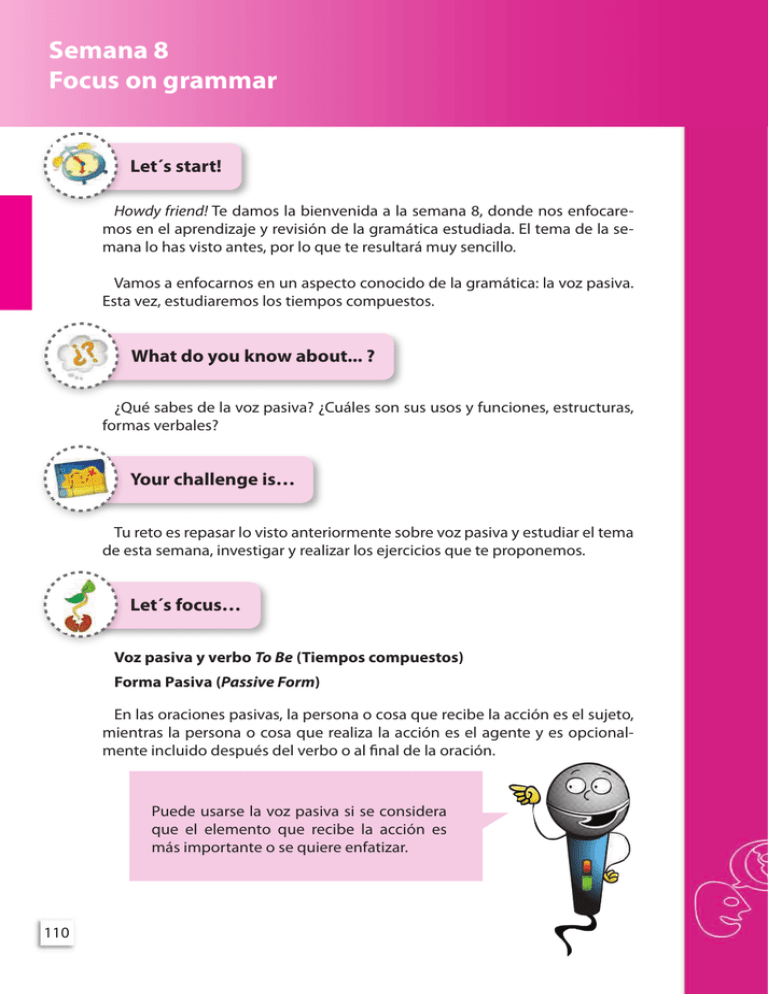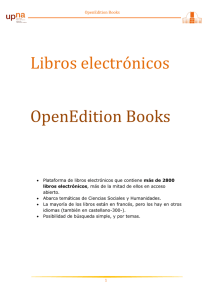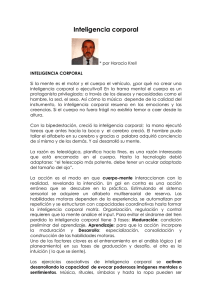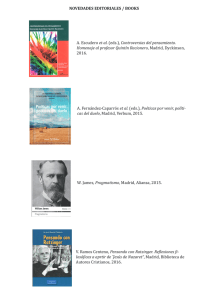Semana 8 Focus on grammar - Radio Fe y Alegría Noticias
Anuncio

Semana Semana 88 Focus on grammar Focus on grammar Let´s start! Howdy friend! Te damos la bienvenida a la semana 8, donde nos enfocaremos en el aprendizaje y revisión de la gramática estudiada. El tema de la semana lo has visto antes, por lo que te resultará muy sencillo. Vamos a enfocarnos en un aspecto conocido de la gramática: la voz pasiva. Esta vez, estudiaremos los tiempos compuestos. What do you know about... ? ¿Qué sabes de la voz pasiva? ¿Cuáles son sus usos y funciones, estructuras, formas verbales? Your challenge is… Tu reto es repasar lo visto anteriormente sobre voz pasiva y estudiar el tema de esta semana, investigar y realizar los ejercicios que te proponemos. Let´s focus… Voz pasiva y verbo To Be (Tiempos compuestos) Forma Pasiva (Passive Form) En las oraciones pasivas, la persona o cosa que recibe la acción es el sujeto, mientras la persona o cosa que realiza la acción es el agente y es opcionalmente incluido después del verbo o al final de la oración. Puede usarse la voz pasiva si se considera que el elemento que recibe la acción es más importante o se quiere enfatizar. 110 Semana 8 Focus on grammar [Thing receiving action] + [be] + [past participle of verb] + [by] + [thing doing action] Repasemos los tiempos simples con la voz pasiva: Tabla 8. The passive voice: tiempos simples Voz Activa Tiempo (sujeto o agente) (Verbo principal) Voz Pasiva (objeto) (objeto) (to be) (par ticipio pasado verbo principal) Simple present You Buy Books Books are Bought Simple past You bought Books Books were Bought Simple future You Will + buy Books Books will + be Bought Simple modals You Can + buy Books Books can +be Bought Should+buy books Present You buy books Past You bought books Future You will buy books Modals You can buy books books should+be bought Books are bought Books were bought Books will be bought Books can be bought ¿Observas la diferencia entre voz activa y voz pasiva? Recuerda la estructura de este tipo de oraciones: ACTIVA: Sujeto o agente + verbo principal + objeto (Peter ) (paints) (the house) PASIVA: Objeto o paciente + verbo TO BE + participio pasado del verbo (The house) (is) (painted) 111 Semana 8 Focus on grammar La voz pasiva puede formarse en cualquier tiempo verbal: presente, pasado, futuro o presente perfecto. Observa la figura 3. Recuerda el uso de la voz pasiva y sus ejemplos. Figura 3. Voz pasiva PRESENTE = (to be + participio) FUTURO = (will + to be + participio) The letter is sent by the president The letter was sent by the president The letter will be sent by the president The letter has been sent by the president PASADO = (to be + participio) PRESENTE PERFECTO = (have/has + participio de to be + participio del verbo) Además, podemos formar la voz pasiva con cualquier otro tiempo verbal compuesto, como el pasado perfecto y los verbos modales. Tabla 9. Passive voice: tiempos compuestos y modales Tiempo 112 Sujeto o agente Voz Activa Participio Aux have o pasado ververbo modal bo principal Objeto Present Perfect You Have Bought Books Past perfect You Had Bought Books Perfect Modals You Should+have Bought Would+have Must+have May/might+ have Books Semana 8 Focus on grammar Present Perfect Past Perfect Perfect modals Tiempo You have bought books You had bought books You (would) have bought books (Must) (should) Voz Pasiva Participio Aux Have o Modal+ pasado de have to be Objeto Participio pasado verbo principal Present Perfect Books Have Been Bought Past perfect Books Had Been Bought Perfect Modals Books Should have Been Bought Present Perfect Past Perfect Perfect modals Books have been bought Books had been bought Books would have been bought Books must have been bought Books should have been bought Let´s know more… Para saber más, revisa en el multimedia la información que te dejamos acerca de las formas interrogativas en voz pasiva. Estudia la tabla que encontrarás allí y luego realiza los ejercicios en la siguiente sección. Apply your knowledge 1. Lee el siguiente diálogo entre Carlos y Susana. Identifica las estructuras de pasiva en el texto y subráyalas. 113 Semana 8 Focus on grammar Susana: Hello, Carlos! How was your vacation? Carlos: Not so funny…Last summer our house was painted all by me. Susana: Well, I suppose that you enjoyed the rest of the holidays after it was finished. Carlos: No way, it took me one month to finish all that work. Susana: And this work has been done all by yourself? Carlos: Yes, I wasn’t helped. First, the exterior was washed using warm water and a mild detergent. Then all the pores in the walls were sea led with putty. Finally, the exterior could be painted. Susana: What kind of painting was used? Carlos: A latex paint was used because it is easy to apply and cleans up with water. Susana: What color did you paint the house? Carlos: A color was used that was very close to the original color. Susana: How did you feel when the work was already done? 114 Carlos: When the job was finished, a great deal of satisfaction was felt by me. I had to pat myself on the back. Even my dad said that a good job was done. Semana 8 Focus on grammar 2. Completa los ejercicios con la forma de voz pasiva de los verbos entre paréntesis, en el tiempo verbal que se indica. Ejemplo: A letter __________ by Peter. (to write - Simple Present) Answer: A letter is written by Peter. by the teacher today. (to explain - Simple Present) a) The words a letter the day before yesterday. (to send - Simple Past) b) We . It’s too old. (not/to steal - will-future) c) This car because of snow. (to close - Pastt Perfect) d) This street next week. (to open - will-future) e) A new restaurant to the party yesterday. (to invite - Simple Past) f ) He . (can/not/to see - Simple Present) g) The blue box h) I i) The dishes j) I the book by my friend last Sunday. (to give - Simple Past) by my little brother. (not/to wash - Present Perfect) by Robert. (not/to ask - will-future) 3. Ejercicios en Passive Voice - Past Perfect Reescribe las oraciones en voz pasiva con el pasado perfecto: a) I had worn blue shoes. b) Joe had cleaned the tables. c) We had lost the key. d) They had started a fight. e) I had read an article. f ) I had not closed the window. g) They had not bought the paper. h) She had not noticed me. i) Had she solved the problem? j) Had he recorded that song? Let´s show what we know… Para demostrar tus saberes y ponerlos en práctica, vamos a trabajar en equipo; preferiblemente, en parejas. Esta semana, el reto consistirá en realizar 115 Semana 8 Focus on grammar una entrevista en inglés a uno de tus compañeros, para luego participar en la Radio Revista Juvenil, presentando las entrevistas que se realizaron en inglés. Haz preguntas en voz pasiva para que sean contestadas de la misma manera. Escojan un tema común, con el que puedan identificarse todos los participantes del sistema IRFA; como por ejemplo, su proceso de aprendizaje del inglés, su desempeño en la mención, o acerca de su trabajo. Lleven sus entrevistas y respuestas al CCA y escojan la que más les guste para ser presentada en la Radio Revista. 116



